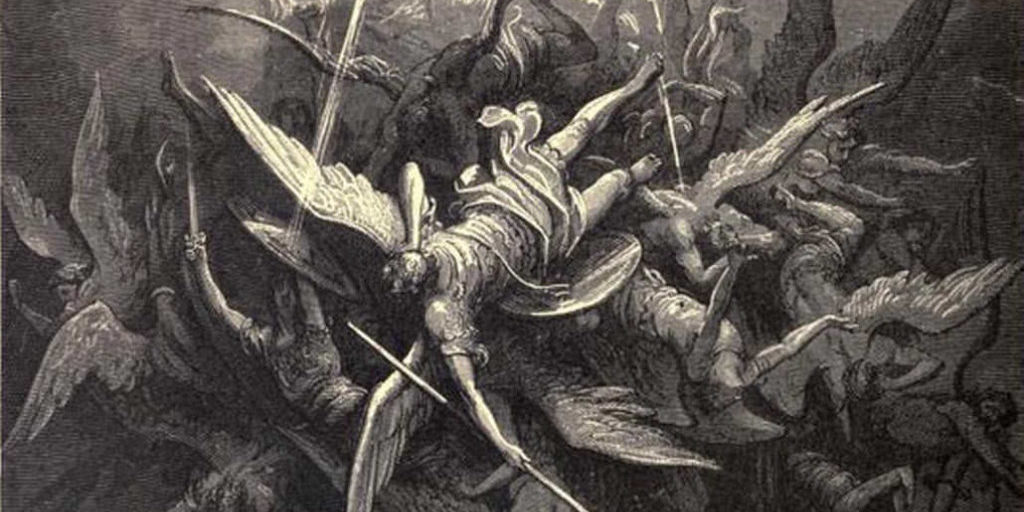
Divine Providence and the Problem of Innocent Suffering
I recently preached a sermon titled “Divine Providence and the Problem of Suffering and Evil” from Job 42:2-3. To prepare, I read Milton’s Paradise Lost. Like Job, Milton offers no rational explanation for the problem of evil, but he does describe a biblical worldview as a context for thinking about the problem.
Paradise Lost
In Book 1 Milton has Beelzebub (who is, in the poem, Satan’s chief lieutenant) say of the recent war they waged in heaven:
“O Prince, O Chief of many Throned Powers,
That led the embattl’d Seraphim to War
Under thy conduct, and in dreadful deeds
Fearless, endanger’d Heav’n’s perpetual King;
And put to proof his high Supremacy,
Whether upheld by strength, or Chance, or Fate” (128-33)
Beelzebub frames the war they launched against God as a test of which worldview is true. Is the universe ultimately a product of pure Chance or a kind of blind, impersonal Fate? Or is God ultimately the Sovereign Ruler over all? He frankly admits that the outcome of the war is the answer to the question:
“But what if he our Conqueror (whom I now
Of force believe Almighty, since no less
Than such could have o’rpowered such a force as ours)” (lines 143-45)
Beelzebub is forced to concede that Fate and Chance are not the ultimate meaning of the universe. Divine omnipotence is.
The outcome of the war in heaven has forced the devils to concede the truth of the first line of the Apostles’ Creed: “I believe in God the Father Almighty.” It has thus answered the worldview question; the devils now see clearly that God is Omnipotent. As James tells us, “Even the demons believe—and shudder” (Ja. 2:19). Now the question is “How will Satan respond?” Milton tells us that Satan says to his lieutenant:Even Satan knows that God alone is Almighty. No creature can overcome his will. There may be two sides, but one created the other. Click To Tweet
“Fall’n Cherub, to be weak is miserable
Doing or Suffering: but of this be sure,
To do aught good never will be our task,
But ever to do ill our sole delight,
As being the contrary to his high will
Whom we resist.” (lines 157-62)
Satan will never submit! Instead, he will seek to pervert God’s providence at every turn, thus inverting Romans 8:28:
“If then his Providence
Out of our evil seek to bring forth good,
Our labor must be to pervert that end,
And out of good still to find means of evil” (lines 162-65)
This world is as it is because it is a battlefield between Good and Evil. The Manichees were half right but wholly wrong. The battle is real, but they thought the two opposing forces were both eternal and equally ultimate. Milton teaches us better. Even Satan knows that God alone is Almighty. No creature can overcome his will. There may be two sides, but one created the other.
Good and Evil in Job
In Job we see the same framing of the problem of evil as in Paradise Lost. Instead of a rational explanation for evil, we have a description of a biblical worldview. God reveals himself to Job as the Transcendent Creator and the All-Powerful One. In Job 38-41 God teaches Job his Omnipotence. What Satan learned the hard way (by defeat in war) Job learns the easy way (by heeding God’s Word). This leads to Job’s confession: “I know that you can do all things and that no purpose of yours can be thwarted.” (Job 42:2)
Job 1-2 reveals that the origin of Job’s affliction is the malevolent scheming of Satan, who seeks to prevent humans from worshipping God by turning good into evil. The central message of Job is that nothing can prevent the providence of God from ensuring that the world ultimately turns out to be a comedy and not a tragedy.
This world is a battlefield between God and Satan. History is one long war between Good and Evil. Divine providence cannot be defeated even though powerful, intelligent, evil forces are trying their best to do so. This is why we must walk by faith and not by sight, because we are in the middle of the war. We don’t see the end yet, but we believe in the omnipotence of God.
But what does Divine omnipotence mean? For Job it means that God is sovereign even over death:
“For I know that my Redeemer lives,
and at the last he will stand upon the earth.
And after my skin has been thus destroyed,
yet in my flesh I shall see God.” (19:25-26)
God is omnipotent. His providence can never be defeated – even if we die. God’s ace in the hole is the power to raise the dead. Nothing beats that. This is why Satan can do his worst. Even if it is the case that:
“For your sake we are being killed all the day long;
we are regarded as sheep to be slaughtered.” (Rom. 8:36, citing Ps. 44:22)
even then, the believer can still say with Paul:
“No, in all these things we are more than conquerors through him who loved us. For I am sure that neither death nor life, nor angels nor rulers, nor things present nor things to come, nor powers, nor height nor depth, nor anything else in all creation, will be able to separate us from the love of God in Christ Jesus our Lord.” (Rom 8:37-39)
In the end, Divine omnipotence is not limited even by the death of creatures. He is perfectly capable of raising the dead and giving new life. This is why Job can say in response to his friends: “Though he slay me, I will hope in him” (Job 13:15)
Job resists the temptation to despair because he knows God. His friends know a lot of worldly wisdom but they do not know God. This is why in chapter 42 Job is told by God to offer a sacrifice for his friends. He is the priestly mediator who stands in the gap between unbelieving creatures and Almighty God. God tells Job’s friends that his servant Job will pray for them and that he will “accept his prayer not to deal with you according to your folly.” (Job 42:8)Jesus Christ is the final answer to the problem of innocent suffering. Click To Tweet
Job thus prefigures another, greater Mediator, who also suffers at the hands of Satan and his minions, who also stands in the gap between unbelieving creatures and Almighty God, and who also prays for us that God might not deal with us according to our folly. Jesus Christ is the final answer to the problem of innocent suffering. There may be no justice in this life, but this life is not all there is. Resurrection power is real. Thee is hope beyond death—specifically, hope that the universe will turn out to be a just universe after all.
Job teaches us that there are two answers to the problem of innocent suffering. One is the penultimate answer for here and now, which is faith and patience. The other is the ultimate answer for eternity, which is resurrection. We need the former while we wait for the latter.
Knowing that we live in a war zone and that evil is the perversion of good by intelligent, malevolent, spiritual forces in rebellion against God makes our situation intelligible. We cannot understand all the purposes of God, but we can understand why it makes sense to exercise faith in a world like this one. Job and Milton both teach us a biblical worldview in the context of which the problem is evil is not solved, but is put into perspective.

